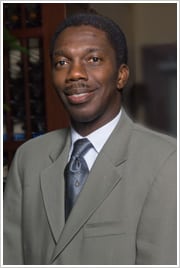The chair of the National Medical Association’s Ob/Gyn section changes every two years, and the current physician in the top seat is Roland Matthews, M.D., chair, department of obstetrics and gynecology, at Morehouse School of Medicine in Atlanta. Recently, he sat down with Black Health Matters to talk about the direction of the section’s Breastfeeding Alliance under his leadership.
Black Health Matters: What are your plans for the Breastfeeding Alliance?
Roland Matthews, M.D.: We started what I think is a great initiative, specifically the breastfeeding initiative. I intend to continue it and see what we can do to make sure it gets better, reaches more people and has more activities—and that we get into the community as best we can. We need to get our doctors and our hospitals and clinics to promote breastfeeding more.
What’s the current state of breastfeeding among black women?
Dr. Matthews: What’s going on is that there needs to be a bigger emphasis to get our patients to breastfeed. Right now, we ask patients whether or not they’re going to breastfeed, and we encourage them to breastfeed, but I’m not sure we spend enough time talking about the benefits of breastfeeding in a way that allows them to see that.
Let’s say a patient came in and she had endometrial cancer. We would take them into a conference room. The mom is there, the husband is there, two sisters are there. We tell them why it’s important for the surgery, the risks, benefits of chemo. They ask questions. They know that is important. You take some time to do that. In fairness to us as clinicians, we are not given that time to spend on breastfeeding.
Do you believe the main reason our breastfeeding numbers are lower than women of all other races is because clinicians don’t have adequate time to cover its benefits?
Dr. Matthews: It’s not that our patients in our communities don’t want to breastfeeding. But sometimes they’re not in a position to breastfeed. There are some barriers patients have. [For instance], they work at a job site where there’s nowhere for them to pump. The younger patients—we have patients who are in school. We need to figure out how to help everybody recognize the importance of breastfeeding—both from a medical and social standpoint. We just have to keep working at it.
Other than continuing the work started by the two past chairs, are there plans to establish new programming through the Breastfeeding Alliance?
Dr. Matthews: For a hospital to be designated Baby Friendly, it really is up to the individual hospitals. But we’re giving an award to someone in our section who is really trying to do that at his or her individual hospital. We’re hoping to give a practice or hospital an award that has done this. We’re trying to work with Dr. Paula Schreck [medical director of breastfeeding medicine at St. John Providence Health System in Detroit] to get a course together for folks who are trying to journey into getting the Baby Friendly status. Right now, the National Medical Association is working with a group to put a CME course around that.
That’s great.
Dr. Matthews: It is, but at the end of the day, it’s really the hospital. They have to decide it’s important for them. It only works if providers, nurses and midwives in the hospital think it’s important as well. We encourage our membership to go back to their states and hospitals and practices and champion this particular initiative.
And there’s a new website?
Dr. Matthews: NMABreastfeed.com. [At press time, the website was schedule to go live the last week of March 2017.]
Roland Matthews, M.D.: Getting Moms to the Benefits of Breastfeeding






